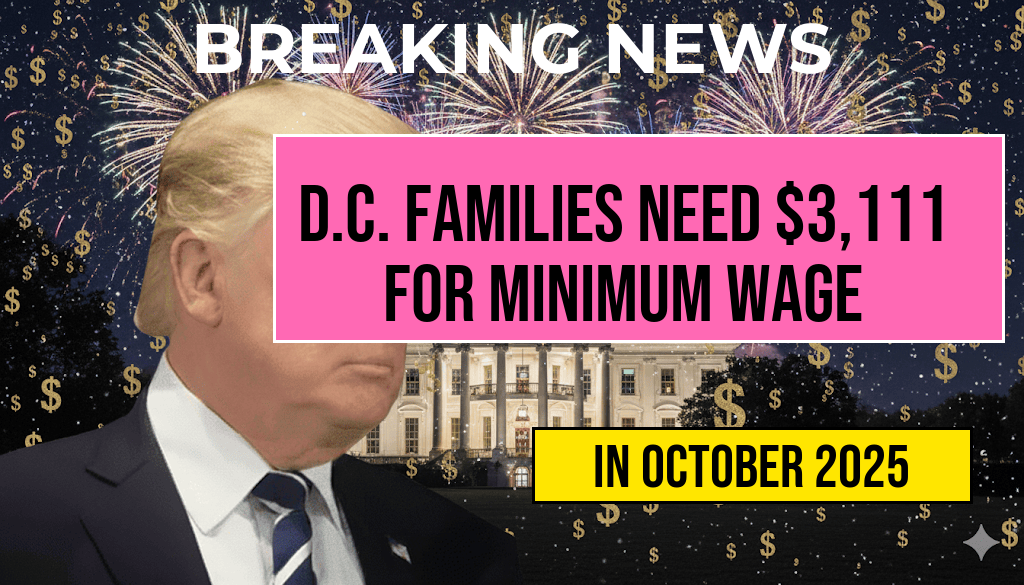Families in Washington, D.C. are facing a daunting financial landscape as they grapple with a new income requirement for full-time work. With the minimum wage set at $17.95 per hour, a household now needs to earn at least $3,111 monthly, before taxes, to make ends meet. This figure reflects the challenges many families encounter in a city known for its high cost of living. As inflation continues to affect everyday expenses, many are questioning whether the current wage is sufficient to sustain a household in the nation’s capital.
Understanding the Wage and Income Gap
The $3,111 monthly income threshold for families effectively translates to an annual salary of approximately $37,332, which can be a significant challenge for many low-income workers. The minimum wage, although higher than the federal rate of $7.25, still leaves many families struggling to afford basic necessities such as housing, food, and healthcare.
Cost of Living in Washington, D.C.
According to recent data, the cost of living in Washington, D.C. is among the highest in the United States. Families are facing escalating prices in various sectors:
- Housing: The average rent for a one-bedroom apartment in D.C. exceeds $2,300, making up a significant portion of a family’s budget.
- Food: The cost of groceries has risen sharply, with a family of four now spending an average of $1,000 per month.
- Healthcare: Medical expenses continue to climb, putting additional strain on family finances.
The Impact on Families
The income requirement and the current minimum wage have profound implications for D.C. families. Many parents are forced to work multiple jobs or long hours just to meet their basic financial obligations. This situation raises concerns about work-life balance, children’s education, and overall family well-being.
Some families are turning to government assistance programs to supplement their income, but the availability and accessibility of these resources can vary widely. The reliance on assistance can create additional challenges, including stigma and dependency issues.
Potential Solutions and Community Responses
As the gap between wages and living costs widens, community leaders and policymakers are exploring various solutions to address the issue. Some of the strategies being considered include:
- Increasing the Minimum Wage: Advocates argue for a higher minimum wage to reflect the actual cost of living.
- Affordable Housing Initiatives: There are ongoing discussions about implementing policies that would increase the availability of affordable housing options for low-income families.
- Enhanced Childcare Support: Providing better access to affordable childcare can allow more parents to enter the workforce and increase their earning potential.
Community Support and Resources
Local organizations are stepping up to provide support to families in need. Resources such as food banks, financial literacy programs, and job training initiatives are crucial for helping families navigate the economic challenges they face. For more information on local resources, families can visit [D.C. Hunger Solutions](https://www.dchungersolutions.org) or [Capital Area Food Bank](https://www.capitalareafoodbank.org).
Looking Ahead
The issue of wage sufficiency in Washington, D.C. is not just a local concern; it reflects national trends in income inequality and the rising cost of living across urban areas. As families continue to advocate for fair wages and better living conditions, the conversation surrounding minimum wage policies is likely to gain momentum. The outcome of these discussions could significantly influence the financial stability of countless families in the capital.
For those interested in the ongoing debate about minimum wage laws and their impact, further insights can be found in articles from reputable sources such as [Forbes](https://www.forbes.com) and [The Economic Policy Institute](https://www.epi.org).
Frequently Asked Questions
What is the minimum wage in D.C.?
The current minimum wage in D.C. is $17.95 per hour, which is one of the highest in the country.
What is the monthly income requirement for families?
D.C. families need to meet a monthly income requirement of $3,111 for full-time work at the minimum wage before taxes.
How does the minimum wage affect family budgets?
The minimum wage can significantly impact family budgets, as families must earn enough to cover living expenses, which can be challenging at the current rate.
Are there any benefits for low-income families in D.C.?
Yes, low-income families in D.C. may be eligible for various assistance programs, including food stamps and housing assistance, which can help supplement their income.
What can families do if they can’t meet the income requirement?
If families cannot meet the income requirement, they may explore job training programs, seek higher-paying employment opportunities, or apply for government assistance to help bridge the gap.






